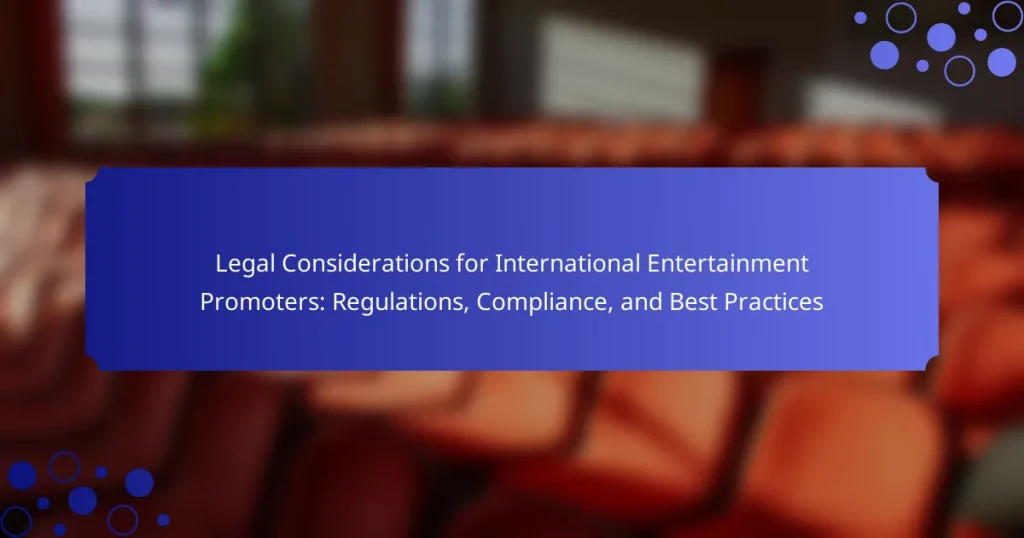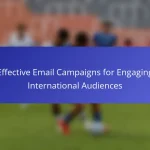International entertainment promoters operate within a complex legal landscape that includes contract law, intellectual property rights, and local regulatory compliance. Key considerations for promoters involve ensuring enforceable contracts with artists, venues, and sponsors, securing necessary licenses for original works, and adhering to local event permits and safety standards. Understanding tax obligations and labor laws is essential for effective management of local staff and international talent. Additionally, establishing strong relationships with local stakeholders, implementing fair pricing strategies, and maintaining ethical practices are crucial for successful operations. This article outlines best practices for navigating these legal considerations to foster a responsible and compliant entertainment industry.
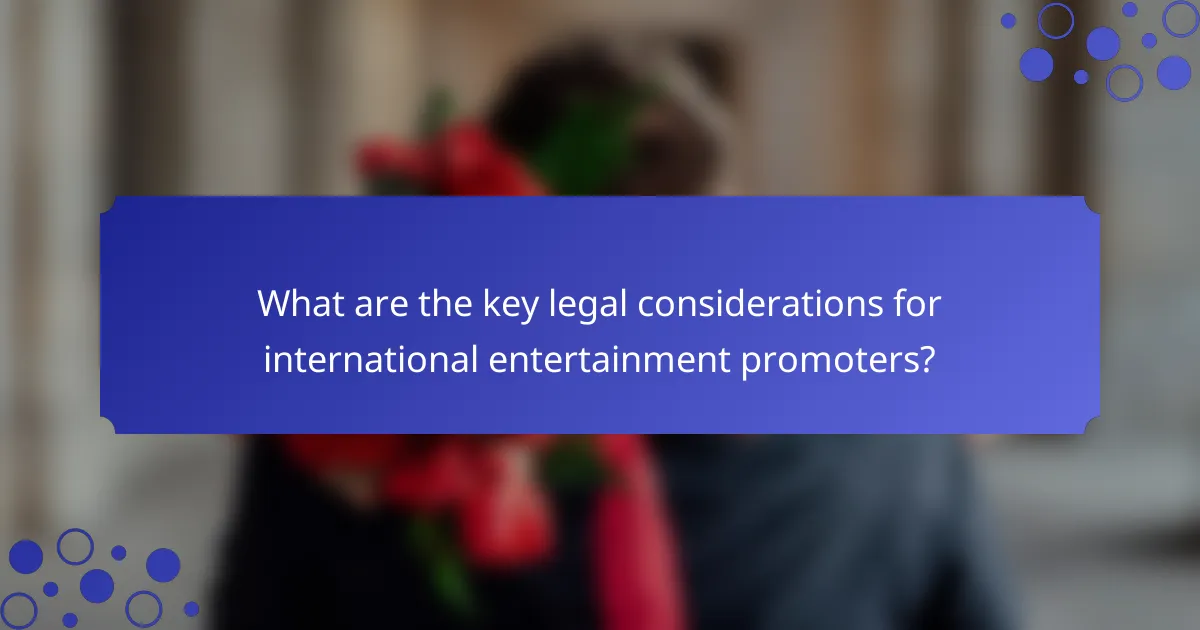
What are the key legal considerations for international entertainment promoters?
International entertainment promoters must navigate various legal considerations. These include contract law, intellectual property rights, and compliance with local regulations. Contract law governs agreements with artists, venues, and sponsors. It is essential to ensure contracts are enforceable in each jurisdiction. Intellectual property rights protect original works, requiring promoters to secure necessary licenses. Compliance with local regulations includes permits for events and adherence to safety standards. Tax obligations vary by country, impacting revenue and profit margins. Understanding labor laws is crucial for hiring local staff and managing international talent. Dispute resolution mechanisms should be established to address potential conflicts.
How do regulations differ across countries for entertainment promotion?
Regulations for entertainment promotion differ significantly across countries. Each nation has its own legal framework governing advertising, sponsorship, and promotional activities. For instance, the United States allows a wide range of promotional tactics, including celebrity endorsements and social media marketing, under the Federal Trade Commission’s guidelines. In contrast, countries like France impose strict regulations on advertising aimed at children and require transparency in sponsorship disclosures.
Additionally, some countries, such as Germany, have specific laws that limit the use of certain promotional tactics in broadcasting. In the UK, the Advertising Standards Authority enforces rules to ensure that promotions are not misleading or harmful. These variations reflect cultural attitudes towards advertising and consumer protection.
Overall, international entertainment promoters must navigate these diverse regulations to ensure compliance and effective marketing strategies.
What are the most common regulations that affect international promoters?
International promoters are primarily affected by regulations related to licensing, taxation, and labor laws. Licensing regulations ensure that promoters hold the necessary permits to operate in different jurisdictions. Tax regulations often require promoters to comply with local tax laws, which can vary significantly between countries. Labor laws govern the employment of staff and performers, ensuring compliance with minimum wage and working conditions. Additionally, intellectual property laws protect the rights of creators and performers, impacting how events are marketed and produced. Compliance with these regulations is crucial to avoid legal penalties and ensure smooth operations in international markets.
How can promoters stay informed about changing regulations?
Promoters can stay informed about changing regulations by regularly consulting legal resources. These resources include government websites that publish updates on laws and regulations. Subscribing to industry newsletters is also beneficial. These newsletters often highlight regulatory changes relevant to promoters. Attending industry conferences and seminars allows promoters to hear directly from experts. Networking with legal professionals can provide insights into upcoming changes. Joining professional associations offers access to exclusive resources and updates. Utilizing social media platforms can also facilitate real-time information sharing. Staying proactive in these areas ensures promoters remain compliant with regulations.
Why is compliance important for international entertainment promoters?
Compliance is crucial for international entertainment promoters to ensure legal operation across different jurisdictions. It helps promoters adhere to local laws, regulations, and licensing requirements. Non-compliance can lead to severe penalties, including fines and legal action. Compliance also protects promoters from potential lawsuits related to copyright infringement and contract disputes. Additionally, it fosters trust with stakeholders, including artists, venues, and audiences. By demonstrating compliance, promoters enhance their reputation and credibility in the industry. This is essential for securing partnerships and sponsorships. Ultimately, compliance mitigates risks and supports sustainable business practices in the global entertainment market.
What are the potential consequences of non-compliance?
Non-compliance can lead to severe legal repercussions for international entertainment promoters. These may include hefty fines imposed by regulatory authorities. Additionally, promoters may face lawsuits from affected parties, leading to costly legal battles. Non-compliance can also result in the suspension or revocation of licenses necessary for operation. This could halt business activities, causing financial losses. Furthermore, reputational damage can occur, leading to a loss of trust from clients and partners. In some cases, criminal charges may be filed against individuals responsible for non-compliance. These consequences underscore the importance of adhering to regulations in the entertainment industry.
How can compliance enhance the reputation of a promoter?
Compliance enhances the reputation of a promoter by demonstrating adherence to legal and ethical standards. This adherence fosters trust among clients, partners, and audiences. Trust is crucial in the entertainment industry, where relationships are vital for success. A promoter known for compliance is more likely to attract reputable clients. This can lead to increased business opportunities and partnerships. Furthermore, compliance minimizes legal risks, protecting the promoter from potential lawsuits or penalties. Promoters who prioritize compliance can build a strong and positive brand image. A strong brand image can lead to greater audience loyalty and support. Ultimately, compliance contributes to long-term success in the competitive entertainment landscape.
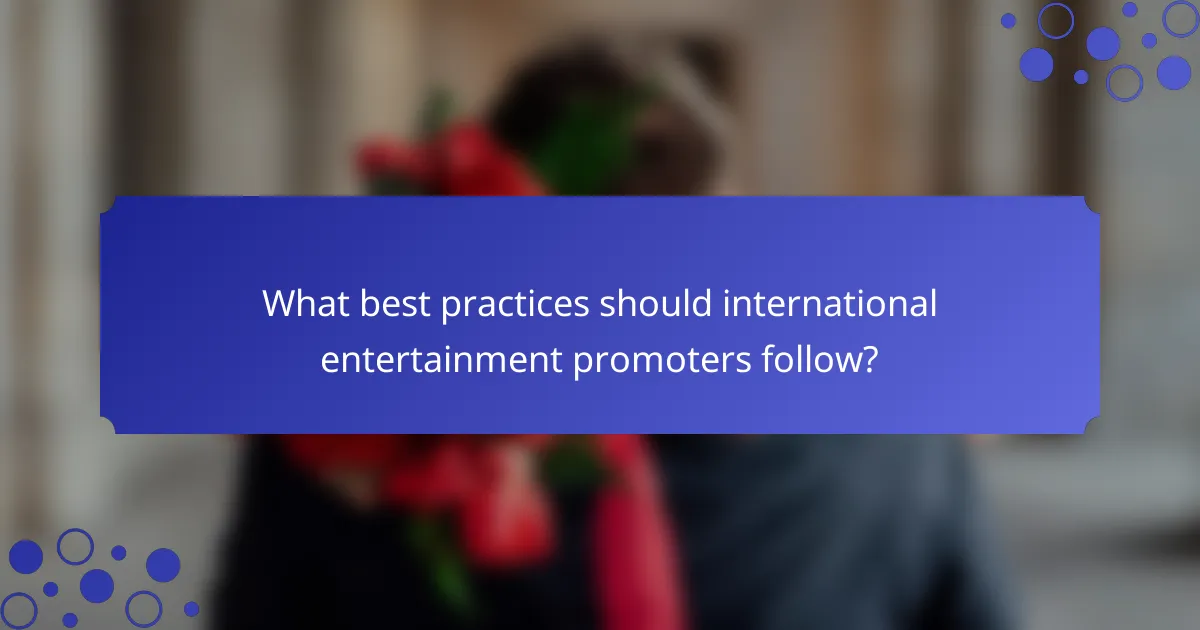
What best practices should international entertainment promoters follow?
International entertainment promoters should prioritize thorough research of local regulations in each market. Understanding licensing requirements is essential for compliance. They must also establish strong relationships with local stakeholders. This includes venues, artists, and local authorities. Effective communication is crucial for successful collaborations. Additionally, promoters should invest in comprehensive insurance coverage to mitigate risks. Clear contracts with all parties involved help prevent disputes. Utilizing data analytics can enhance audience targeting and marketing strategies. Finally, staying updated on industry trends ensures adaptability in a dynamic environment.
How can promoters effectively navigate international contracts?
Promoters can effectively navigate international contracts by understanding local laws and regulations. Each country has specific legal requirements that impact contract enforcement. Promoters should conduct thorough research on these laws before entering agreements. Consulting with legal experts in the respective jurisdictions is essential. They can provide insights into compliance and risk management. Additionally, using clear and precise language in contracts minimizes misunderstandings. Including dispute resolution clauses can help address potential conflicts. Finally, maintaining open communication with international partners fosters trust and collaboration.
What essential elements should be included in contracts?
Essential elements that should be included in contracts are offer, acceptance, consideration, mutual consent, capacity, and legality. An offer is a proposal to enter into an agreement. Acceptance is the agreement to the terms of the offer. Consideration refers to something of value exchanged between parties. Mutual consent indicates that all parties agree to the terms. Capacity means that parties have the legal ability to enter into a contract. Legality ensures that the contract’s purpose is lawful. These elements are foundational for a valid contract, as stated in contract law principles.
How can promoters mitigate risks in contract negotiations?
Promoters can mitigate risks in contract negotiations by conducting thorough due diligence. This involves researching the parties involved to ensure credibility and reliability. Promoters should also clearly define terms and conditions in contracts. Specificity helps prevent misunderstandings and disputes. Utilizing standardized contracts can provide a solid framework for negotiations. Legal consultation is essential to ensure compliance with applicable laws and regulations. Insurance can protect against unforeseen liabilities during the event. Additionally, including termination clauses can offer an exit strategy if circumstances change. These strategies collectively reduce potential risks associated with contract negotiations.
What strategies can be implemented for successful event planning?
Effective event planning requires clear objectives and thorough organization. Start by defining the event’s purpose and target audience. This helps in tailoring the event to meet specific needs. Create a detailed timeline to track tasks and deadlines. This ensures all elements are executed on schedule. Budgeting is crucial; allocate funds for all aspects, including venue, catering, and marketing. Research and select appropriate venues that comply with local regulations. This minimizes legal issues and enhances attendee experience. Build a reliable team by assigning roles based on expertise. This fosters accountability and efficiency. Finally, implement a feedback mechanism post-event. This allows for continuous improvement in future planning.
How does understanding local laws impact event planning?
Understanding local laws significantly impacts event planning by ensuring compliance and minimizing legal risks. Local laws dictate permits, licenses, and regulations necessary for hosting events. Failure to comply can result in fines, penalties, or event cancellation. Additionally, understanding laws related to noise, safety, and crowd control is crucial for successful event execution. Knowledge of liability laws helps in drafting contracts and managing risks effectively. For instance, local health regulations may affect food vendors and sanitation requirements. Therefore, thorough research on local laws is essential for smooth event operations.
What role do permits and licenses play in successful promotions?
Permits and licenses are essential for successful promotions as they ensure legal compliance. They provide authorization to conduct specific activities, protecting promoters from legal repercussions. Obtaining the necessary permits demonstrates professionalism and builds trust with stakeholders. Additionally, permits can dictate the scope and location of promotions, influencing audience reach. For example, a public event may require a special permit from local authorities. Failure to secure these can result in fines or event cancellations. Thus, permits and licenses are critical for mitigating risks and enhancing promotional effectiveness.
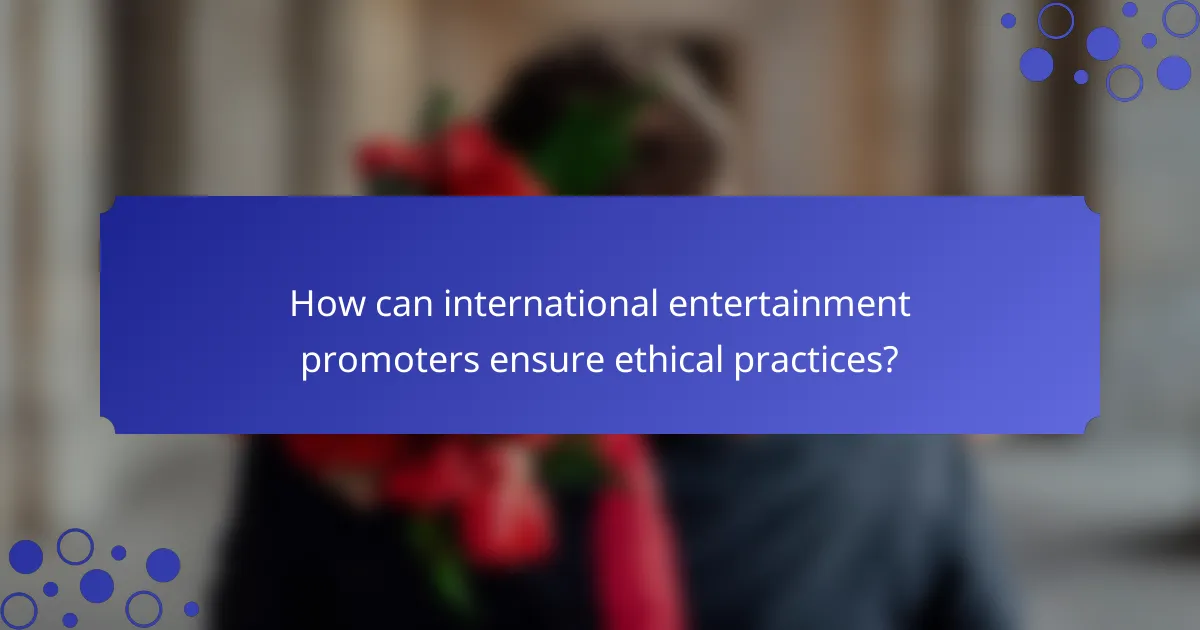
How can international entertainment promoters ensure ethical practices?
International entertainment promoters can ensure ethical practices by adhering to local laws and international regulations. Compliance with labor laws protects the rights of workers involved in events. Transparency in contracts fosters trust between promoters, artists, and vendors. Promoters should conduct thorough background checks on partners to avoid associations with unethical practices. Implementing fair pricing strategies ensures equitable access for audiences. Engaging in sustainable practices minimizes environmental impact and promotes social responsibility. Regular training on ethical standards for staff and partners reinforces a culture of integrity. Monitoring and evaluating practices helps identify areas for improvement. These measures contribute to a more ethical entertainment industry.
What are the ethical considerations in international entertainment promotion?
Ethical considerations in international entertainment promotion include cultural sensitivity, transparency, and respect for local laws. Cultural sensitivity involves understanding and respecting the diverse values and traditions of different regions. Transparency ensures that promotional practices are honest and do not mislead audiences. Respect for local laws means adhering to regulations that govern advertising and content in each market. Additionally, ethical promotion avoids exploitation of vulnerable populations, such as children or marginalized groups. These considerations are vital for maintaining a positive brand image and fostering trust with global audiences.
How can promoters promote inclusivity and diversity in events?
Promoters can promote inclusivity and diversity in events by implementing diverse programming and outreach strategies. They should curate a lineup that features artists from various backgrounds. This includes different races, genders, and cultures. Promoters can also collaborate with community organizations to reach underrepresented groups. Offering accessible venues and services is crucial for inclusivity. This includes wheelchair access and language translation services. Additionally, conducting surveys to understand audience demographics can inform better planning. Research indicates that diverse teams lead to more innovative event experiences. Promoters should also create safe spaces for all attendees to foster a welcoming environment.
What measures can be taken to ensure fair treatment of artists and attendees?
Fair treatment of artists and attendees can be ensured through transparent contracts and equitable payment structures. Contracts should clearly outline the terms of engagement, including payment schedules and performance expectations. Implementing standardized payment practices helps prevent exploitation of artists. Additionally, providing attendees with clear information on event policies promotes transparency. This includes refund policies and safety measures in place. Establishing a code of conduct for both artists and attendees fosters mutual respect. Regular feedback mechanisms can also be implemented to address concerns from both parties. These measures create a balanced environment that values the rights and experiences of everyone involved.
What practical tips can enhance the effectiveness of international entertainment promotion?
Utilizing targeted marketing strategies enhances the effectiveness of international entertainment promotion. Identify specific demographics interested in the content. Tailor promotional materials to resonate with cultural preferences and values. Leverage social media platforms popular in each region for maximum reach. Collaborate with local influencers to gain credibility and visibility. Ensure compliance with local regulations to avoid legal issues. Analyze performance metrics to refine future campaigns. Consistent engagement with the audience builds loyalty and trust.
How should promoters build relationships with local authorities and stakeholders?
Promoters should build relationships with local authorities and stakeholders through consistent communication and collaboration. Establishing regular meetings fosters trust and understanding. Engaging in community events shows commitment to local interests. Providing transparent information about events builds credibility. Listening to community concerns demonstrates respect and willingness to adapt. Collaborating on safety and regulatory compliance ensures mutual benefits. Utilizing local resources can strengthen partnerships and support. Building these relationships can lead to smoother event approvals and enhanced community support.
What resources are available for ongoing education in legal compliance?
Ongoing education in legal compliance can be accessed through various resources. Professional organizations like the American Bar Association offer seminars and webinars. Online platforms such as Coursera and LinkedIn Learning provide courses on legal compliance topics. Accreditation bodies often host workshops and conferences for industry updates. Legal compliance journals publish articles and case studies for continuous learning. Additionally, law schools may offer continuing education programs tailored to compliance issues. These resources ensure that professionals stay informed about evolving legal standards and practices.
The main entity of the article is ‘International Entertainment Promoters’. This article provides a comprehensive overview of the key legal considerations that these promoters must navigate, including contract law, intellectual property rights, and compliance with local regulations. It outlines the differences in regulations across countries, the importance of compliance, and the potential consequences of non-compliance. Additionally, the article discusses best practices for effective event planning, ethical considerations, and strategies for building relationships with local authorities and stakeholders, ensuring that promoters can operate successfully in diverse international markets.
